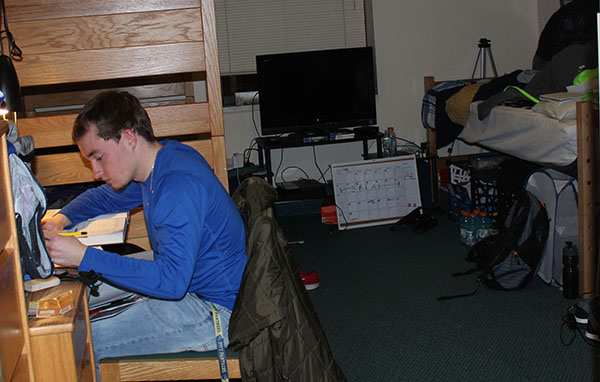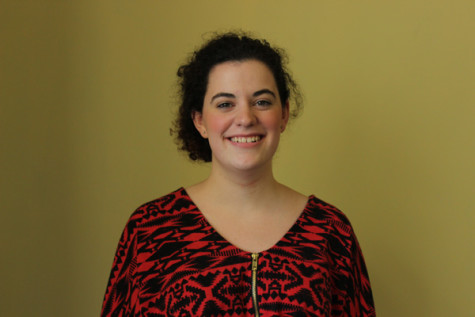Housing staff creates coed rooming options

Sophomore Michael Leach studies at his desk in his Living/Learning Center dorm room. Leach lives with two roommates.
March 2, 2016
Housing officials have introduced two housing options for next year: coed housing, which they are calling gender-neutral, and triple room incentives.
The options were announced in a mass email sent Feb. 22 about the housing re-contracting process.
Both options are to be offered in the Living/Learning Center but may be expanded to other residencies in future years, according to the university website.
Gender-neutral housing allows residents to choose roommates regardless of gender or sex. Housing applicants are to select their roommate on the online housing form April 12, though now they will not be restricted by gender.
Students in romantic relationships are discouraged from living together, according to the website, but not forbidden from living together.
Housing and Residence Life Director Mark Dougherty said this option is about having roommates with whom residents are relaxed.
“These reasons revolve around being in a comfortable setting, and with a trusted individual,” he said.
In the past five years, a few students requested gender-neutral arrangements because of gender expression and identity, Dougherty said. No students have expressed interest for this year, he said, but students do not need to alert housing before submitting the online application.
Though this option is not based off another university’s options, Dougherty said, the structure is similar to other campuses that have had success.
Living/Learning Center resident Mitchell Towne said he worries mixed-gender roommates could lead to sexual harassment or assault. It could work with friends, he said, but those dating could break up and fight.
Another Living/Learning Center resident, Sean McCarney, said he welcomes the option.
“You should be allowed to room with whomever you please,” he said.
Though he likes living with his male friend, he said, he would be willing to live with his girlfriend. He would also consider living with a female friend.
“The guys-and-girls-can’t-be-friends (mindset) is both narrow-minded and arrogant,” he said. “If some dude wants to room with his good female friend, they are welcome to do whatever they want.”
The largest possible complication Dougherty said he foresees is romantic couples living together then breaking up.
“These students would then be living in a truly difficult situation where they are dealing not only with a roommate situation, but also dealing with the emotional stress that comes from being in close proximity with an ex,” Dougherty said.
It may be difficult to move broken-up couples because of room availability. Residents have the option of choosing another roommate in the event of a vacancy. If they do not, a roommate of the same biological sex is to be assigned, according to the website.
Another housing option this year is discounted tripled rooms. Residents who choose to or are assigned to live with two other people are to receive a 30-percent discount on the standard rate.
Residents are to be able to select rooms from the Living/Learning Center’s first floor during the online selection process. During the process, residents are to be able to choose two roommates.
An estimated 150 students need to live in tripled rooms to meet housing demands, Dougherty said. By asking residents to voluntarily live in tripled rooms, he hopes to reduce the number assigned to triple rooms involuntarily.
“While they would receive the same discount, it’s easier on every(one) involved if a tripled situation is something you enter into voluntarily,” he said.
Students assigned to triple rooms this year received a discount, he said, but not those who volunteered.
Towne lives with two roommates in the Living/Learning Center this year. He volunteered this year, he said, and would do so again.
He and his roommates get along, he said, and the discount would be a plus. He would not, however, want to live with two strangers, he said.
“Three (strangers) close together just doesn’t seem appealing,” he said.
Residents may choose to live in tripled rooms that are also gender-neutral, according to the website.
Both gender-neutral rooms and triple rooms seem like efforts to fit more residents, McCarney said. In the gender-neutral case, it is by loosening restrictions.
“Why build a new housing option or improve old residential buildings when UPJ can instead offer incentives to stuff in — or consolidate — students in preexisting housing?”
He also said officials may have adopted the gender-neutral option because they felt pressured to be more progressive by other universities. They may have been avoiding gender discrimination cases, he said.
Whatever their motives, he said, he is happy to see officials doing the right thing.

